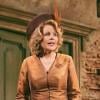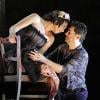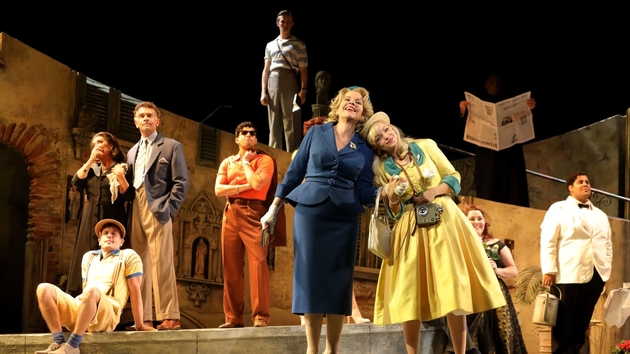
She came, she sang, she conquered. But was it enough for Renée Fleming’s still radiant soprano to carry the day — or night, as the case may be — in Adam Guettel and Craig Lucas’s musical theater work, The Light in the Piazza? Opening at the Dorothy Chandler Pavilion on Saturday evening for seven performances under the auspices of the now Plácido Domingo-less Los Angeles Opera, this Light, unfortunately, shone rather intermittently.
With her portrayal of Margaret Johnson heartfelt, determined, and vocally ripe, 60-year old Fleming lit up the stage in this story of a wealthy 1950s American tourist in Florence — the scene of her long ago honeymoon — whose 26-year-old, developmentally disabled daughter falls desperately in love with an Italian boy. An adaptation of Elizabeth Spencer’s novella that spawned a movie version in 1962 with Olivia de Havilland, Yvette Mimieux and, well, George Hamilton, Piazza, the musical, snagged six Tony awards for its 2005 Broadway production, landing at LA’s Ahmanson Theatre in 2006.
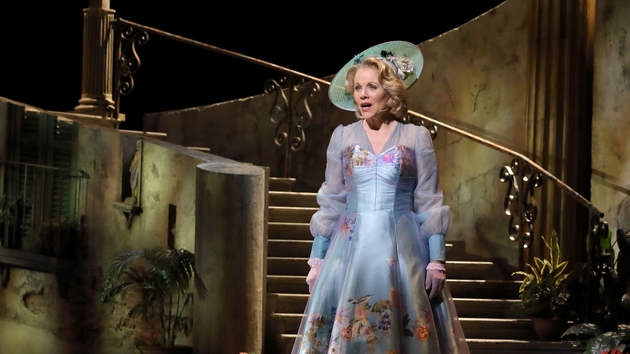
Ably directed here by Daniel Evans, with a curved half-ruined wall of a set by Robert Jones that’s akin to a Getty Villa wannabe, the problem with Piazza is not with the singing: Emmy award-winning Disney TV and film star Dove Cameron (who’s got more than 30 million Instagram followers) sails through her often frenetic moods with vocal ease. A commanding Rob Houchen, as 20-year-old Fabrizio, brings oomph to his tunes, even if his big infatuation number is delivered in Italian. (Supertitles are in English, save for this, with portions of the score sung in Italian or, worse, — broken English.) Indeed, add the powerful baritone presence of Broadway stalwart Brian Stokes Mitchell — still going strong at 61 as Fabrizio’s father, Signor Naccarelli — and this theater piece would seem to be a winner.
Alas, a musical without any hummable music is somewhat of an issue. Guettel, the grandson of musical theater royalty, Richard Rodgers, has crafted an ambitious score that is pleasingly textural with a dollop of Italian ardor, but rarely lands a definitive punch. And while Kimberly Grigsby brings authority to the podium, coaxing swoon-worthy sounds from the LA Opera Orchestra, notably from the harp, clarinet, and violins, these are harmonies in search of a more definitive home.
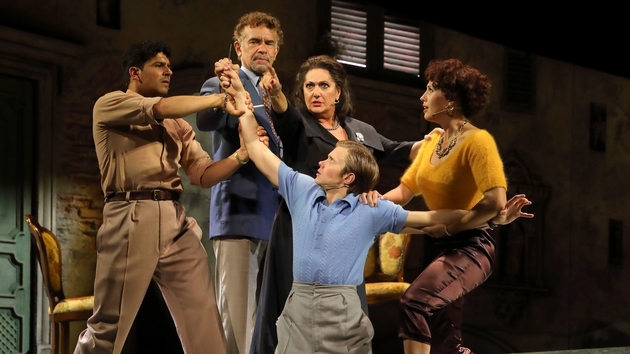
Guettel also wrote the lyrics, which veer from confounding and aspirational to hauntingly bittersweet, with Lucas’s book basically a love-conquers-all scenario, albeit one that happens to take place in “the land of naked marble boys” (a line from the song, “The Beauty Is”). To that end, it’s populated with a lot of expressive, if stereotypical, Italianized characters: Celinde Schoenmaker, in sexy neo-Rita Moreno mode as Fabrizio’s sluttish sister-in-law, breathes fire as Franca, especially in her lacerating aria, “The Joy You Feel”; opera singer Marie McLaughlin brings a touch of class to her Signora Naccarelli; and Liam Tamne is Fabrizio’s trod-upon brother, providing a bit of humor in the process.
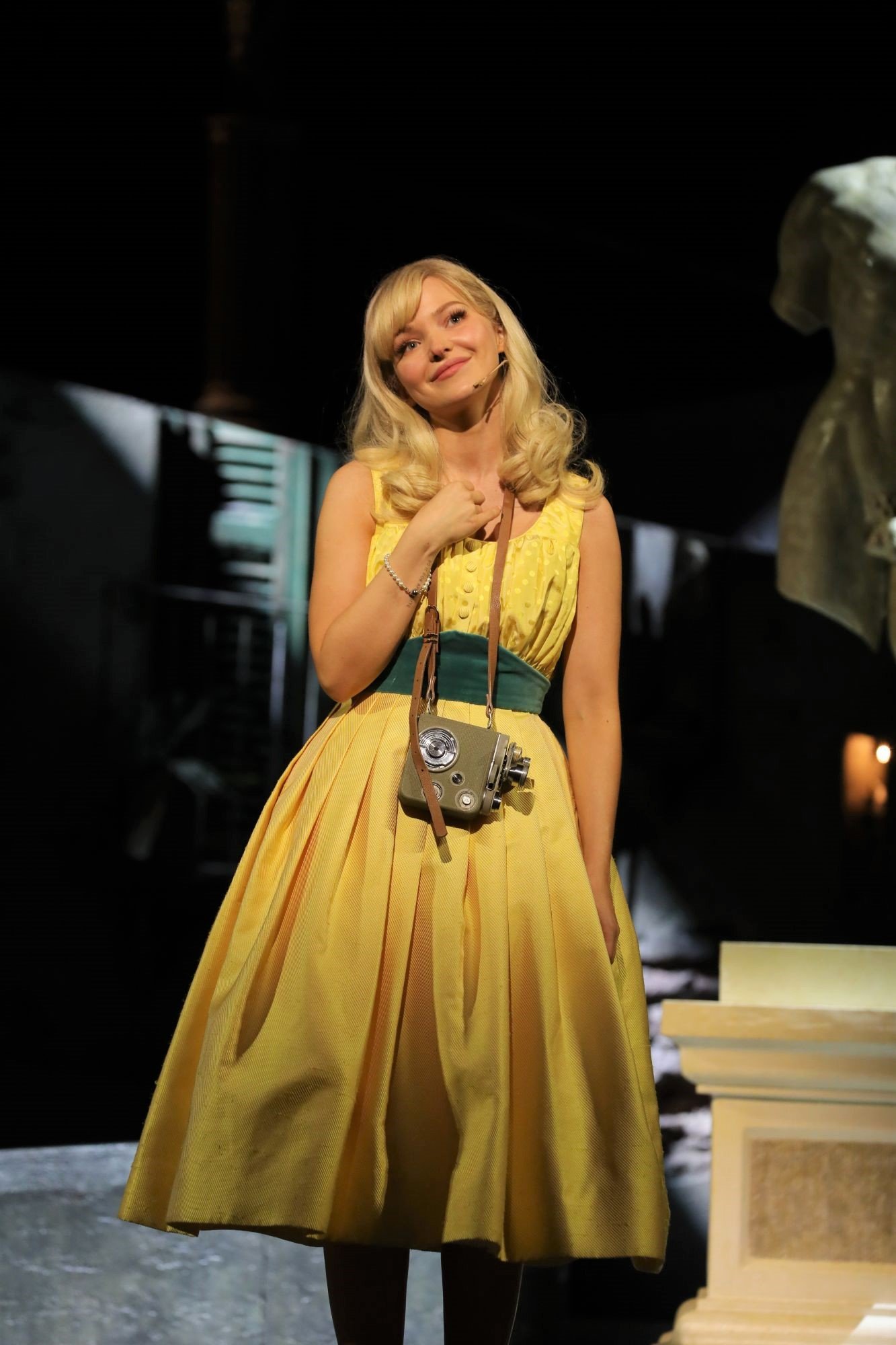
Not so funny is Clara’s backstory: Revealed in an aside by Margaret near the end of Act 1, she recounts how her daughter was kicked in the head by a pony as a young girl, the traumatic injury stunting her brain development, hence the rationale behind Margaret’s helicopter parenting.
Mother, on the other purse-toting hand, looking chic in Brigitte Reiffenstuel’s cinched-waist costumes that could have waltzed off the pages of a ’50s Vogue spread, has another cross to bear: Her marriage to a callous tobacco industrialist meanie (Malcolm Sinclair’s Roy, seen only in a pair of long-distance telephone conversations) is hollow, marked by Fleming’s heartbreaking Act 1 aria, “Dividing Day.”
Bringing all her talents to bear, Fleming, no matter that this song, along with others in the piece “lies on the low side of her voice” (according to her), is pathos personified. Pondering how, when, and why her relationship crumbled, in lyrics such as “I can see the winter in your eyes,” Margaret will ultimately come to realize that she wants more for her daughter than a loveless existence.
But before that awareness comes to light — no pun intended — Margaret is hell-bent upon stopping Clara and Fabrizio’s love-at-first-sight relationship, with mama whisking her girl off to Rome at the beginning of Act 2. Meanwhile, the Naccarelli family tries to console Fabrizio, who wants to die rather than live without his beloved, all of which is voiced in the frenzied sextet, “Aiutami” (“Help Me”), sung in Italian and then translated by Signora Naccarelli in a scene that tries a tad too hard to be funny.
Miserable in Rome, the Johnsons return to the city on the Arno and wedding plans are soon made, including Clara converting to Catholicism, while Margaret grapples with the notion of coming clean about Clara’s apparent innocence — that it’s not from naivety but from that nasty childhood injury. A moment of truth arrives when the Naccarellis call off the festivities after they’ve seen Clara’s handwriting, prompting Margaret to offer more money as a dowry — as well as to take a walk with the handsome Signor to discuss things, a jaunt that leads to an unexpected kiss.
It’s a moment that could move the story into more intriguing territory — and it would have been cool to see more of Mitchell — but that was not to be. And while the book raises questions of moral dilemmas, they remain virtually unresolved, with nuptial vows happily exchanged. Fleming, alone on the stage, sings the soul-baring “Fable,” declaiming that “Love’s a fake / Love’s a fable,” a fitting finale that also wishes Clara’s love to last forever, bringing Mark Henderson’s moody lighting down on this Piazza, a well-intentioned — and well-sung — curious hybrid of a show.



